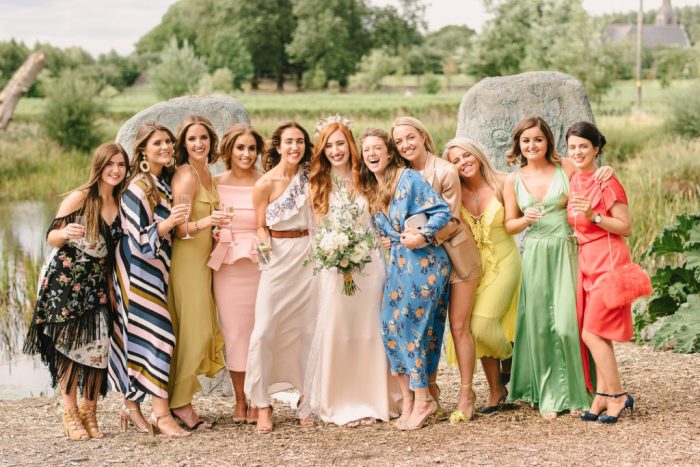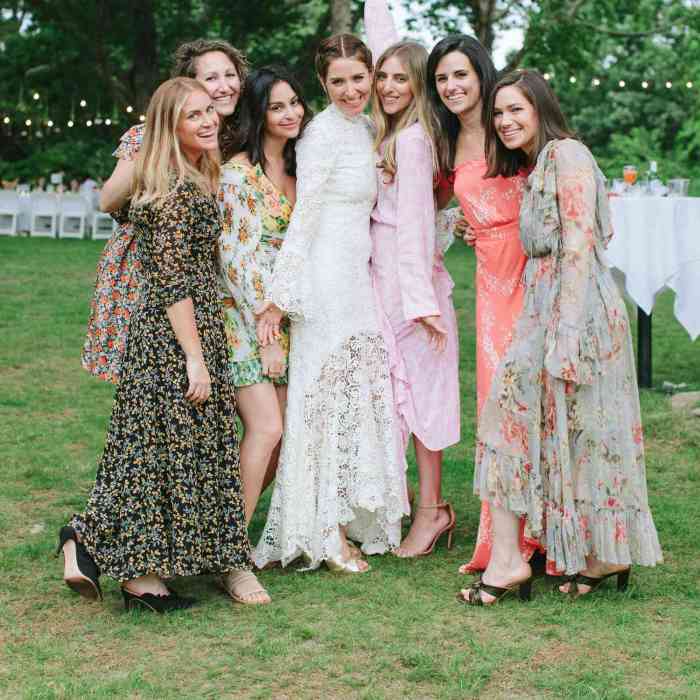Women’s Formal Wedding Dresses
Women’s formal dresses for weddings – Choosing the perfect formal dress for a wedding can be an exciting yet daunting task. This guide explores various dress styles, fabrics, accessories, and etiquette considerations to help you find the ideal outfit for any wedding celebration. We’ll cover everything from understanding different dress codes to selecting accessories that complement your style and the wedding’s theme, all while staying within your budget.
Types of Women’s Formal Wedding Dresses
Several dress styles are suitable for formal weddings, each offering unique silhouettes and aesthetics. The choice depends on personal preference, body type, and the wedding’s formality.
A-line dresses are universally flattering, cinching at the waist and flaring gently towards the hem. They’re versatile and suitable for various body types. Mermaid gowns hug the body closely until the knees, then flare dramatically, creating a striking silhouette. These are ideal for those who want to showcase their figure. Ballgowns feature a fitted bodice and a full, voluminous skirt, creating a princess-like look.
These are best suited for formal events. Finally, sheath dresses are sleek and form-fitting, creating a sophisticated and elegant appearance. Necklines can range from classic boatnecks and V-necks to more modern halter necks or off-the-shoulder styles. Sleeve lengths vary widely, from sleeveless to long sleeves, and back styles can be simple or feature intricate detailing, such as a keyhole back or a low back with delicate straps.
Fabric selection significantly impacts the dress’s overall look and feel. Common fabrics include:
| Fabric | Description | Properties | Suitability for Wedding |
|---|---|---|---|
| Silk | Luxurious natural fiber | Smooth, lustrous, drapes well | Highly suitable, especially for formal weddings |
| Chiffon | Lightweight, sheer fabric | Flowy, delicate, often used for overlays | Suitable for less formal weddings or as an overlay |
| Lace | Intricate woven fabric | Delicate, romantic, can be used for entire dress or accents | Suitable for various wedding styles, adds elegance |
| Satin | Smooth, lustrous fabric | Shiny, drapes well, can be delicate | Suitable for formal weddings, creates a sophisticated look |
Color palettes for formal wedding attire vary. Pastels and jewel tones are popular choices for daytime events, while deeper, richer colors are often preferred for evening weddings. However, always avoid wearing white or ivory, as these are reserved for the bride. Black is generally acceptable unless the invitation specifically requests otherwise. Navy, emerald green, burgundy, and blush are generally safe and elegant choices.
Finding the Perfect Dress: Considerations for the Guest
Several factors influence dress selection, ensuring the guest’s outfit is appropriate and stylish for the occasion. Careful consideration of these factors ensures a harmonious blend of personal style and event decorum.
- Wedding Venue: A beach wedding calls for a lighter, more casual dress than a formal ballroom event.
- Dress Code: Black-tie weddings require floor-length gowns, while cocktail attire allows for shorter, more playful dresses.
- Personal Style: Choose a dress that reflects your personality and makes you feel confident and comfortable.
Choosing a dress that flatters your body type is crucial. The following styles are generally considered flattering for different body shapes:
- Hourglass: A-line, mermaid, fit-and-flare
- Pear: A-line, empire waist, ballgown
- Apple: Empire waist, A-line, V-neck
- Rectangle: Fit-and-flare, A-line, belted dresses
Comfort and practicality are paramount. Choose a dress that allows for easy movement and pair it with comfortable yet stylish shoes. Consider the length of the event and the activities planned. A dress that’s too restrictive or impractical can detract from your enjoyment of the celebration.
Accessories and Styling for Wedding Guest Dresses

Source: vogue.com
Accessories elevate a formal wedding guest dress, adding personality and sophistication. However, it’s crucial to choose accessories that complement the dress and the overall wedding aesthetic without overshadowing the bride.
| Accessory | Description | Material Suggestions | Style Considerations |
|---|---|---|---|
| Jewelry | Necklaces, earrings, bracelets | Gold, silver, pearls, gemstones | Choose pieces that complement the dress’s neckline and overall style; avoid overly flashy pieces. |
| Handbag | Small clutch or evening bag | Leather, satin, velvet | Choose a bag that complements the dress’s color and style; avoid large or bulky bags. |
| Shoes | Heels, wedges, or flats | Leather, satin, suede | Choose shoes that are comfortable and appropriate for the venue and dress style; consider heel height and comfort. |
Hair and makeup should complement the dress and the overall wedding aesthetic. Consider your hair length and face shape when choosing a hairstyle. A simple updo can be elegant for a formal event, while loose waves or curls can create a more romantic look. Makeup should be polished but not overly dramatic, ensuring you look your best without competing with the bride.
Budget and Shopping for Formal Wedding Dresses

Source: onefabday.com
Finding an affordable formal dress for a wedding is achievable with careful planning and smart shopping strategies. Setting a realistic budget and exploring various options are key to finding the perfect dress without overspending.
Shopping during sales, considering rental options, or exploring secondhand markets can significantly reduce costs. Online retailers often offer a wider selection and competitive prices, while brick-and-mortar stores allow for trying on dresses and receiving personalized assistance. Online shopping offers convenience but lacks the tactile experience of trying on dresses in person.
Dress Etiquette for Wedding Guests, Women’s formal dresses for weddings

Source: brides.com
Adhering to wedding dress code etiquette is crucial to show respect for the couple and the event’s formality. Understanding appropriate dress lengths, colors, and overall style ensures you’re dressed appropriately for the celebration.
Avoid wearing white or ivory, as these are traditionally reserved for the bride. Black is generally acceptable unless specifically prohibited. Dress length should be appropriate for the venue and dress code; floor-length gowns are typically expected for black-tie events. Consider the time of day and the overall formality of the wedding when selecting your outfit.
- Avoid overly revealing attire.
- Refrain from wearing anything too casual or informal.
- Don’t wear anything that might overshadow the bride.
- Ensure your outfit is clean and well-maintained.
Questions and Answers: Women’s Formal Dresses For Weddings
Can I wear black to a wedding?
While traditionally avoided, black is acceptable at many modern weddings, particularly evening events or those with a formal dress code. However, ensure it’s a sophisticated and elegant black dress, not a simple black dress.
What is the difference between cocktail and black-tie attire?
Cocktail attire is generally less formal than black-tie. Cocktail dresses tend to be knee-length or slightly shorter, while black-tie necessitates floor-length gowns.
How far in advance should I buy my wedding guest dress?
Finding the perfect women’s formal dress for a wedding can be challenging, especially when considering the venue and dress code. Sometimes, a dress might be slightly too revealing or perhaps needs a touch more coverage. If you find yourself in this situation, consider checking out helpful resources like this guide on what to wear over dress to wedding to add a stylish layer.
This way, you can still wear your chosen formal dress while ensuring appropriate attire for the wedding celebration.
It’s advisable to start shopping at least 2-3 months in advance to allow ample time for alterations or finding the perfect dress, especially for popular styles or sizes.
Where can I find affordable formal dresses?
Consider consignment shops, online retailers offering sales, or rental services for budget-friendly options. Department stores often have sales periods as well.
